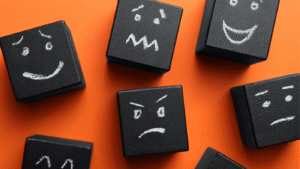Sleep Optimization Guide: 8 Science-Backed Techniques for Better Rest
- Take a warm bath or shower 60-90 minutes before bed (the subsequent temperature drop signals sleep readiness)
- Keep extremities (hands, feet) warm while maintaining a cool core
- Use breathable, temperature-regulating bedding materials
Cognitive Wind-Down Practices
Mental activation is a primary cause of sleep onset difficulties.
Research-supported techniques:
- Worry journaling: Write down tomorrow’s concerns and their potential solutions
- Gratitude practice: Document three positive experiences from your day
- Mental imagery: Visualize peaceful, non-stimulating scenarios
Technology and Sleep Tracking
While technology can disrupt sleep, certain tools can provide valuable insights and improvements.
Sleep Tracking Considerations
Sleep tracking technology has evolved significantly, but understanding its limitations is crucial.
Most accurate consumer technologies:
- EEG headbands (e.g., Muse S, Dreem 2): Measure actual brain waves during sleep
- Bed sensors (e.g., Withings Sleep, Eight Sleep): Track movement, heart rate, and breathing without wearables
- Advanced wearables (e.g., Oura Ring, newer Fitbit models): Use motion, heart rate variability, and temperature for reasonably accurate sleep staging
How to use tracking data:
- Focus on trends rather than single-night data
- Pay attention to sleep consistency rather than just duration
- Use tracking insights to correlate lifestyle factors with sleep quality
Smart Home Sleep Integration
Automation can remove friction from your sleep optimization system.
Effective implementations:
- Programmed lighting that dims gradually before bedtime
- Automated temperature adjustments timed to your sleep schedule
- Smart displays that reduce blue light and brightness in evening hours
- Voice-controlled systems to adjust environment without screen exposure
Nutrition and Supplement Considerations
What and when you consume significantly impacts sleep architecture.
Timing Considerations
- Caffeine: Eliminate at least 8-10 hours before bedtime (caffeine has a half-life of 5-7 hours)
- Alcohol: Avoid within 3 hours of sleep (disrupts REM sleep and increases night awakenings)
- Large meals: Finish 2-3 hours before bedtime to prevent digestive disruption
- Hydration: Taper fluid intake in the evening, with final significant intake 90 minutes before bed
Evidence-Based Supplements
While supplements aren’t magic bullets, some have substantial research support:
- Melatonin: Effective primarily for circadian rhythm adjustment rather than as a sedative (optimal dosage: 0.5-3mg)
- Magnesium glycinate: Supports GABA production and muscle relaxation (typical dosage: 200-400mg)
- L-theanine: Promotes relaxation without sedation (typical dosage: 200mg)
- Ashwagandha: Reduces cortisol and supports stress management (typical dosage: 300-600mg of extract)
Important note: Consult healthcare providers before beginning any supplement regimen, especially if you take medications or have existing health conditions.
Frequently Asked Questions
How much sleep do I actually need?
While the general recommendation is 7-9 hours for adults, individual needs vary based on genetics, activity level, and health status. The best indicator is how you feel and function during the day, not just an arbitrary number.
Can I “catch up” on sleep during weekends?
Research shows that while you can partially compensate for sleep debt, consistent sleep patterns are far more beneficial than the cycle of deprivation and recovery. “Social jet lag” from irregular sleep schedules is associated with poorer health outcomes.
Do sleep trackers actually improve sleep?
Tracking alone doesn’t improve sleep, but the insights can help you identify patterns and make informed changes. However, becoming too fixated on tracking can create “orthosomnia”—anxiety about sleep performance that actually worsens sleep quality.
Is it better to stay in bed or get up when I can’t sleep?
Sleep specialists recommend getting out of bed if you’re unable to fall asleep after 20 minutes. Engage in a quiet, non-stimulating activity with dim lighting until you feel sleepy, then return to bed. This preserves the bed-sleep association.
Optimizing your sleep isn’t about implementing every possible technique simultaneously. Start with the fundamentals of environment and routine, then gradually incorporate additional strategies based on your specific challenges. Remember that consistency is more important than perfection—even small improvements to your sleep quality can yield significant benefits for your overall health and daily performance.




